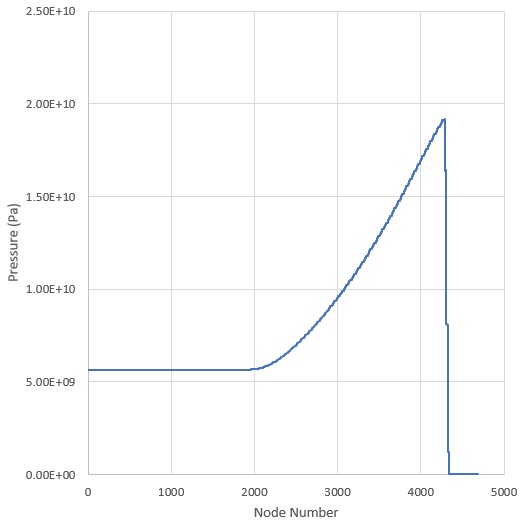VM-EXD-MECH-016
VM-EXD-MECH-016
3-D Burn on Time High Explosive Detonation
Overview
| Reference: | Engineering Data |
| Analysis Type(s): | Explicit Dynamics 3-D |
| Elements: |
8-Node Linear Interpolated Reduced Integration Hex Multi-Material Euler Hex |
| Boundary Conditions: | Velocity |
| Structural Interactions: | No |
| Fluid-Structure Interactions: | No |
| Bonds: | No |
| Materials: | High Explosive (TNT) |
Test Case
Detonate a 3-D column of high explosive using the Lagrange and multi-material Euler solvers.
Calculation Description
The TNT retrieved from the library and used in this analysis has these properties:
| Detonation Velocity = 6930.0 m/s |
| Detonation Pressure = 2.1E7 kPa |
Two parts are created to model a column of high explosive (TNT), one part using the Lagrange solver, the other using the Multi-Material Euler solver.
Both parts are 10 m long (in the X direction). Both consist of 1000 elements.
All nodes of the Lagrange part are constrained to move only in the X direction. In addition, the nodes on the lower X boundary of the Lagrange part are fully constrained.
The default wall boundary condition is used for all boundaries of the Multi-Material Euler part.
A detonation plane using Burn on Time is placed at the left boundary (X = 0), with an initiation time of 0.0.
The calculation is run to t = 0.14 ms.
Calculation Results
This plot shows pressure contours in the two parts at the end of the calculation (t = 0.14 ms):
The detonation front travels at the correct detonation velocity, as the front has nearly reached the right boundary by the end of the simulation. It should arrive at the right boundary at t = 0.144 ms.
The peak multi-material Euler pressure closely matches the predicted detonation pressure of TNT:





